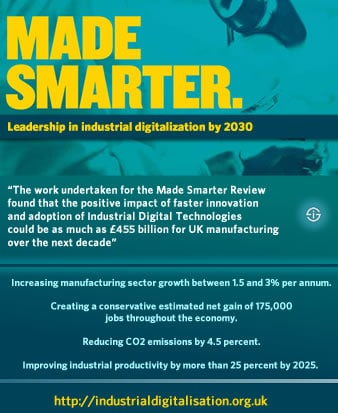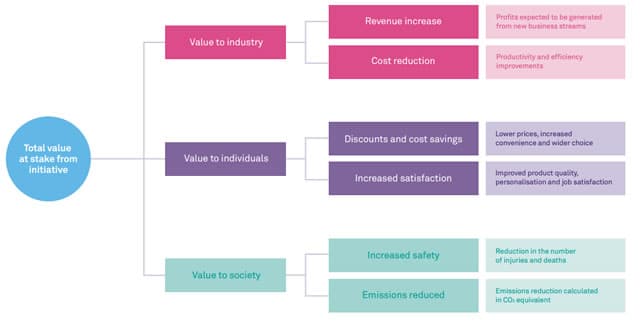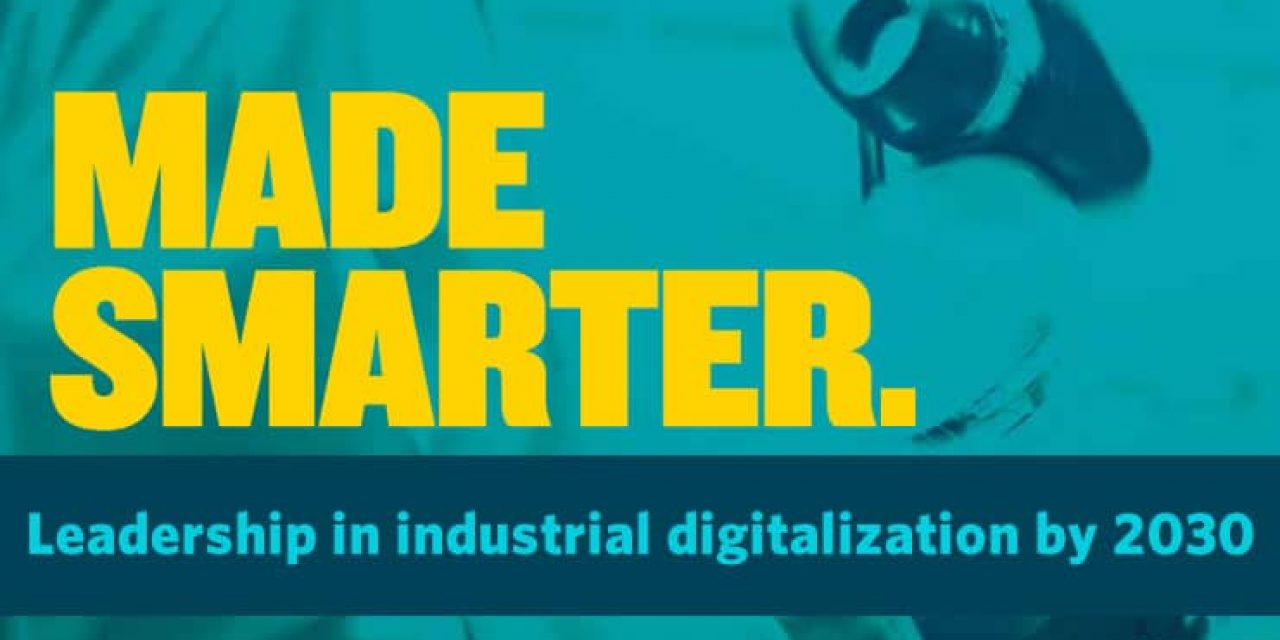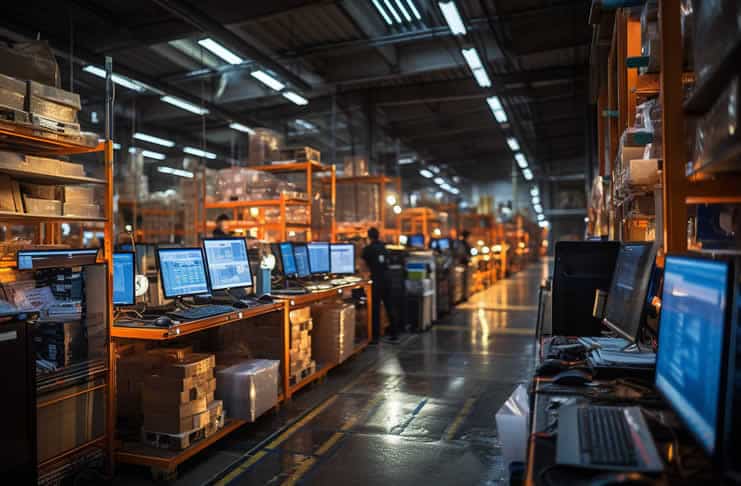The first industrial revolution started in the UK – here is how the country can gain a leading positioning in the fourth industrial revolution, a.k.a. Industry 4.0, according to a government commissioned report, released end October 2017. If the recommendations are followed, the digital transformation of the UK industry could improve industrial productivity by over 25 percent by 2025. An overview that’s interesting for people outside of the UK too.
Do you remember where the first industrial revolution started and which countries played a key role in it? As just mentioned it indeed started in the UK. What is less known is that several inventions leading to that first industrial revolution were done by Belgian and Dutch citizens living in the UK.
So, it probably won’t come as a surprise that Belgium, mainly the French speaking region was the second country where the first industrial revolution happened, closely followed by Germany, Russia and, later, France. Times have changed indeed.
Fast forward to today: the age of the fourth industrial revolution, among others driven by digital technologies such as the cloud, IoT (the Internet of Things), cobots and cyber-physical systems, the integration of IT and OT, new manufacturing techniques such as additive manufacturing and lots of data (or better: actions, including autonomous ones by machines, based upon a mix of sensor data and other data which get analyzed and turned into actionable intelligence with a twist of artificial intelligence). The list of technologies is of course longer but we can’t forget that the fourth industrial revolution isn’t just about technologies.
The UK now has a plan to claim a leading position in the fourth industrial revolution and truly reap the benefits of it. Outlined in the ‘Made Smarter’ document it gives clear recommendations to do so.
Now it’s up to the government and several stakeholders to join forces. What you should know about ‘Made Smarter’ (even if you are not from the UK but involved in industrial transformation).

Moving beyond the current state of industrial transformation
As you know, the fourth industrial revolution is majorly known as a German initiative, Industrie 4.0 or Industry 4.0 in English. Yet, at the same time also the US was quick with its Industrial Internet (interchangeably used with the term Industrial Internet of Things).
Looking at some of the mentioned technological aspects of the fourth industrial revolution (and the third one too for that matter) it’s rather obvious that countries such as the US and Germany were instrumental with their expertise in IT and OT, hardware, software and so on. Belgium wasn’t second this time and the UK so far has been lagging behind a bit this time as well in the digital transformation of its manufacturing industry .
Yet, things might change. Maybe not that much for Belgium but for the UK for sure, at least when looking at the work done in the scope of ‘Made Smarter’. According to the government commissioned report, released end October 2017, a strong collaboration between government, industry and other stakeholders could create several tens of thousands of jobs in the UK, result in a total value of £455bn and put the UK in a leading position in the fourth industrial revolution, despite the catching up to do.
The report was commissioned in the scope of the Industrial Digitalization Review that needs to serve as a platform and initiative to shape and boost the industrial strategy of the UK, mainly by getting a deal with the industry and moving forward the accelerated adoption of digital technologies and of course also the development of such technologies.
Made Smarter: collaboration for industrial digital transformation
The Industrial Digitalization Review was announced end January and the Made Smarter Review can now indeed serve as the basis of a sector deal and become a key pillar of the UK’s emerging Industrial Strategy as the author writes in his foreword, further hoping that the UK can take a much more significant leadership role and a much greater slice of the opportunities arising from the fourth industrial revolution.
To grasp the opportunities of this fourth industrial revolution, collaboration is indeed of the utmost importance and not just on national levels. By now most countries and sometimes even regions such as, how times have changed, the Dutch speaking part of Belgium have their industrial transformation strategies.
However, on top of that the collaboration of organizations in associations such as the Industrial Internet Consortium, (co-)founded by GE or in supra-national organizations such as the EU which wants to boost manufacturing transformation and Industry 4.0 and where recently EU industry organizations pushed for a more ambitious EU industrial strategy, does matter too.
Don’t think that the UK industry doesn’t have the potential to reap the benefits of the fourth industrial revolution as we wrote and showed in our article on the state of that fourth industrial revolution in the UK, which is filled with data.
Did you, for instance, know that in 2015 the UK got ranked third with regards to Industry 4.0 implementation maturity? Still, two years later, in 2017, another survey indicated the UK was badly underprepared for Industry 4.0. Anyway, you can read more about that in the mentioned article.
It’s probably here that we also have to mention Brexit, the uncertainties of organizations and political issues. It’s a widely known fact that (political) stability is the number one reason for foreign investments. For regions that depend in a very high degree on foreign investments that’s a consideration to take into account. We don’t mean the UK when writing this by the way. And then the question becomes how the UK can reap the benefits from that fourth industrial revolution which brings us back to the report, fully entitled “Made Smarter Review 2017”.
In order to remain competitive and become more competitive while closing the current gap in productivity in the UK, the adoption of Industry 4.0 principles (or better: those that fit in the fourth industrial transformation, regardless of name and exact initiative), as do the core technologies, ranging from IoT to cobots, artificial intelligence, big data analytics, cloud, 3D printing and additive manufacturing and the relevant IT technologies is key. Of course, just as in any digital industrial transformation the integration of IT and OT, beyond the technological aspects, ecosystems and data spaces for innovation and transformation are key too. Again: collaboration.
Yet, one needs to start somewhere so removing paper-based processes is also important. And, as is also the case wherever you look, government support is key, as is the mentioned collaboration between government, industry, the academic world and, not forgotten in ‘Made Smarter’, start-ups. Yet, there is more, far more.
The UK’s fourth industrial revolution value at stake
The foreword of the Made Smarter Review is written by Jürgen Wolfgang Maier, the CEO of Siemens in the UK and Ireland who has been living in the UK since 1974 and was appointed chair of the initiative.

Maier was assisted by executives from organizations such as John Lewis Partnership, Cisco, CBI, IBM, Accenture, GSK and GKN. The effort was done in collaboration with other organizations, concerned businesses and the academic world. All in all over 200 organizations provided recommendations and input, including companies such as Rolls-Royce, Bentley Motors, BP and Barclays, associations such as the Royal Academy of Engineering, academic institutions such as the universities of Cambridge, Coventry and Newcastle and a bunch of companies who are active in the UK, ranging from Amazon and GE Aviation to Toyota and SAP. Obviously the leading system integrators and consultancies are present as well.
On the mentioned website you can also find the challenges (and goals) which are also often found back in similar exercises, ranging from the enhancement of productivity and acquiring the needed skillsets to R&D, value optimization and prioritization and of course how to translate it all in commerce and trade. On a technological level we also note the presence of augmented reality and blockchain, among many others. But it’s certainly not just about technologies as you’ll read.
On October 29, 2017, Maier wrote a blog post in which he explains why he feels Britain must lead the fourth industrial revolution.
A quote: “Short term challenges threaten to derail how the UK plans for the long term, and invests in the technologies that will help industry and specifically manufacturing thrive over the next two decades. As business leaders we have therefore focused on this very positive and tangible piece of work and not the short term uncertainties. We believe that we desperately need to have a long term economic vision for the country – regardless of Brexit, regardless of political instability and economic volatility.”
So, what value can the UK derive from the fourth industrial revolution?

In the 231-page (!) ‘Made Smarter Review 2017’ which sets out a plan for the UK to become a global leader in industrial digitalization by 2030 we, among others, read that unlocking the potential of IDTs (short for Industrial Digital Technologies):
- Could lead to a whopping £455 billion for the UK manufacturing industry over the next decade if there is faster innovation and adoption of these technologies,
- Could make the UK manufacturing sector grow between 1.5 and 3 percent per year, taking into account the same conditions,
- Could create a net gain of 175,000 jobs in the same period and that is a ‘conservative estimation’,
- Can reduce C02 emissions by 4.5 percent and, last but not least,
- Can improve industrial productivity by over 25 percent by 2025.
Those are pretty impressive numbers. However, in order to reach those within the set timeframe obviously the mentioned conditions need to be fulfilled and other actions need to be taken to let the fourth industrial revolution benefit the UK as much as possible.
Made Smarter: the recommendations and strategy to become an industrial technology and transformation leader
You can imagine that we’re not going to cover the 231 pages of the ‘Made Smarter Review’ that, among others, explain how to do that (at least not now) and what are the hurdles, challenges and so forth.
Yet, let’s summarize the key recommendations put forward in the lengthy and excellent ‘Made Smarter’ document on the fourth industrial revolution in the UK – and how to fully leverage it.

The report comes with a package of four broader recommendations which contain ‘sub-recommendations’ so to speak and serve as a strategy to bring the UK to that digital industrial leadership by 2030.
Three of the broader recommendations in the package are ‘game-changing’ as the report puts it and one is a support recommendation.
Recommendation 1: create a much more visible and effective digital ecosystem to accelerate the innovation and diffusion of those industrial digital technologies or IDTs.
How? By 1) investing in a so-called National Adoption Program with a pilot in the north west (do think collaboration between industry and start-ups, among others), 2) launching a new innovation program (do think innovation centers or hubs across the UK), 3) by implementing large-scale digital transformational demonstrator programs and 4) by pushing research and development in five areas of expertise the report identified for the UK:
- artificial intelligence, machine learning and data analytics,
- additive manufacturing,
- robots and automation,
- virtual reality and augmented reality and
- the Industrial IoT and connectivity such as 5G, LPWAN and other, mainly, wireless protocols.
The full details, outcomes, investment sums and methods and expected outcomes – in numbers – are in the document.
This is already a pretty game-changing set of actions or recommendations under one umbrella indeed. The second one, in our view, at least is even more game-changing as it touches the human element of the fourth industrial revolution and the skillset issue, always a big challenge, regardless of where you look.
Recommendation 2: Upskill a million (!) industrial workers to enable digital technologies to be successfully exploited.
How? By 1) launching a national skills strategy and implementation group, 2) setting up a digital delivery platform with the content needed for upskilling and reskilling and 3) establishing a training incentivization scheme.
Recommendation 3: Inspire the UK’s next industrial revolution with stronger leadership and branding of the country’s ambition to be a global pioneer in industrial digital technologies.
How? By 1) setting up a campaign to promote awareness and adoption of digital technologies, 2) putting in place a ‘Made Smarter’ (as in the name of the report) commission and 3) setting up interim strategy and support implementation groups.
Recommendation 4: Addressing the key barriers which prevent the adoption of industrial digital technologies which of course is a major challenge as such.
You can think, among others, about privacy, security, intellectual property and data on top of other barriers.
This is really just a very tiny summary of some of the things you can read in the ‘Made Smarter’ document. It’s an amazing piece of work with, among others also a focus on specific industries and applications in those industries (the ‘Industry scope’) and a focus on the several involved technologies (the ‘technology scope’), dubbed the 4.0 digital physical systems.
It’s not just a must-read for those for whom it’s meant: the UK government and UK industry who now need to take actions in order to reap those benefits of the fourth industrial revolution but for anyone who is interested in or involved in the digital transformation of manufacturing and related industries.
Top image: Shutterstock – Copyright: Happy_stocker’s – All other images are the property of their respective mentioned owners.






